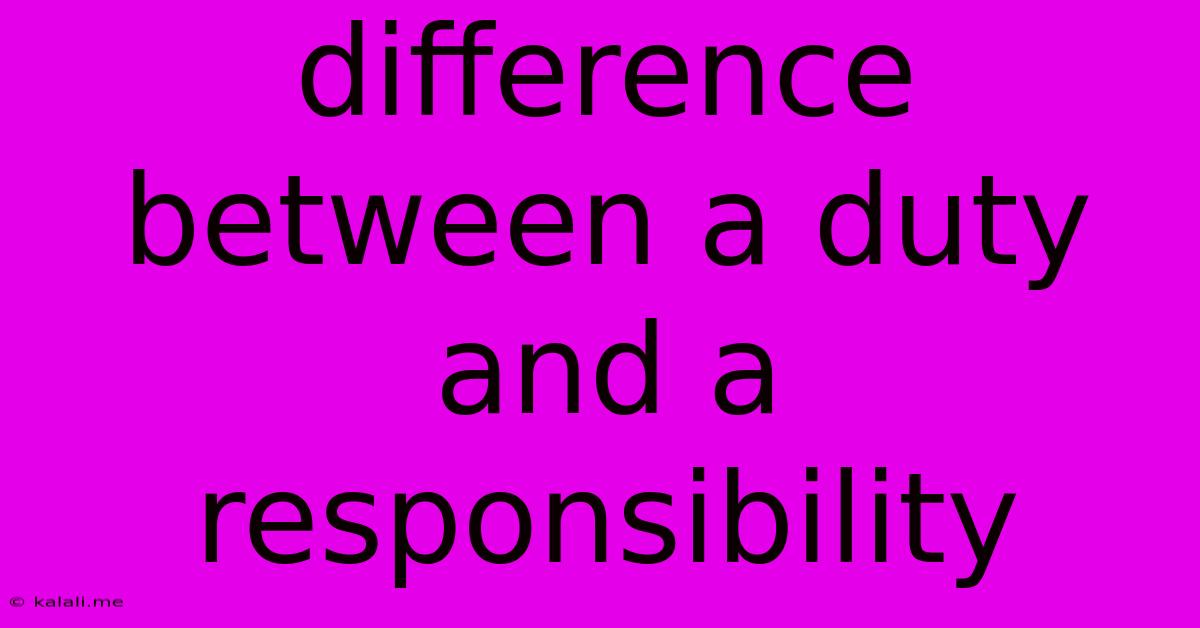Difference Between A Duty And A Responsibility
Kalali
Jun 14, 2025 · 3 min read

Table of Contents
Duty vs. Responsibility: Understanding the Key Differences
While the terms "duty" and "responsibility" are often used interchangeably, they possess distinct meanings with crucial implications in both personal and professional contexts. Understanding the nuances between these two concepts is vital for navigating ethical dilemmas, improving team dynamics, and achieving personal fulfillment. This article will delve into the core differences between duty and responsibility, providing clear examples to illustrate their contrasting natures.
What is a Duty?
A duty is a moral or legal obligation imposed upon an individual. It's something you must do, often dictated by external forces like laws, rules, or social norms. Failure to fulfill a duty can result in legal penalties or social repercussions. Duties are often codified and clearly defined.
- Key Characteristics of a Duty:
- External imposition: Duties are imposed by external authorities or societal expectations.
- Mandatory nature: Compliance is compulsory; non-compliance carries consequences.
- Formal structure: Duties are frequently formalized in laws, regulations, or contracts.
- Objective standard: Duties are typically judged against an objective standard, not personal preference.
Examples of Duties:
- Legal Duties: Paying taxes, obeying traffic laws, serving on a jury (when summoned).
- Professional Duties: A doctor's duty to provide competent care, a lawyer's duty to uphold the law, a teacher's duty to maintain student safety.
- Social Duties: Respecting the law, contributing to society, showing civic responsibility.
What is a Responsibility?
Responsibility, on the other hand, is a commitment or obligation that an individual undertakes willingly or accepts as part of a role. It stems from a sense of ownership, accountability, and moral obligation, but lacks the stringent legal or codified framework of a duty. Responsibilities are often self-imposed or arise from a freely accepted role.
- Key Characteristics of a Responsibility:
- Self-imposed or accepted: Responsibilities are generally chosen or voluntarily assumed.
- Voluntary nature: While there are consequences for neglecting responsibilities, they lack the legal weight of duties.
- Informal structure: Responsibilities are less formally defined than duties.
- Subjective assessment: The fulfillment of a responsibility is often judged based on personal values and commitment.
Examples of Responsibilities:
- Personal Responsibilities: Caring for family members, managing personal finances, maintaining one's health.
- Professional Responsibilities: Meeting project deadlines, mentoring junior colleagues, contributing to team goals.
- Social Responsibilities: Volunteering in the community, advocating for social justice, promoting environmental sustainability.
The Key Distinction:
The fundamental difference lies in the source of obligation. Duties are externally imposed, while responsibilities are self-imposed or accepted. Duties are often mandated by law or regulation, carrying formal penalties for non-compliance. Responsibilities, while carrying significant moral weight and potential consequences for neglect, lack this formal, legal enforcement.
Overlapping Areas:
It's important to note that duties and responsibilities can overlap. For instance, a parent has a legal duty to care for their child (duty), but also has a deep personal responsibility to nurture and guide their child's development (responsibility). The legal duty provides a framework, while the personal responsibility adds a layer of commitment and emotional investment.
Conclusion:
Understanding the difference between duty and responsibility is crucial for navigating the complexities of personal and professional life. Recognizing the distinct nature of these obligations allows for a more nuanced understanding of ethical decision-making, accountability, and personal growth. By acknowledging both our duties and our responsibilities, we can strive to live a more fulfilling and meaningful life.
Latest Posts
Latest Posts
-
If A Waves Frequency Doubles Its Wavelength
Jun 14, 2025
-
New Mexico State University Admission Requirements
Jun 14, 2025
-
What Is Not Required For Photosynthesis
Jun 14, 2025
-
Days To Celebrate In April 2024
Jun 14, 2025
-
What Is Not Found In A Animal Cell
Jun 14, 2025
Related Post
Thank you for visiting our website which covers about Difference Between A Duty And A Responsibility . We hope the information provided has been useful to you. Feel free to contact us if you have any questions or need further assistance. See you next time and don't miss to bookmark.